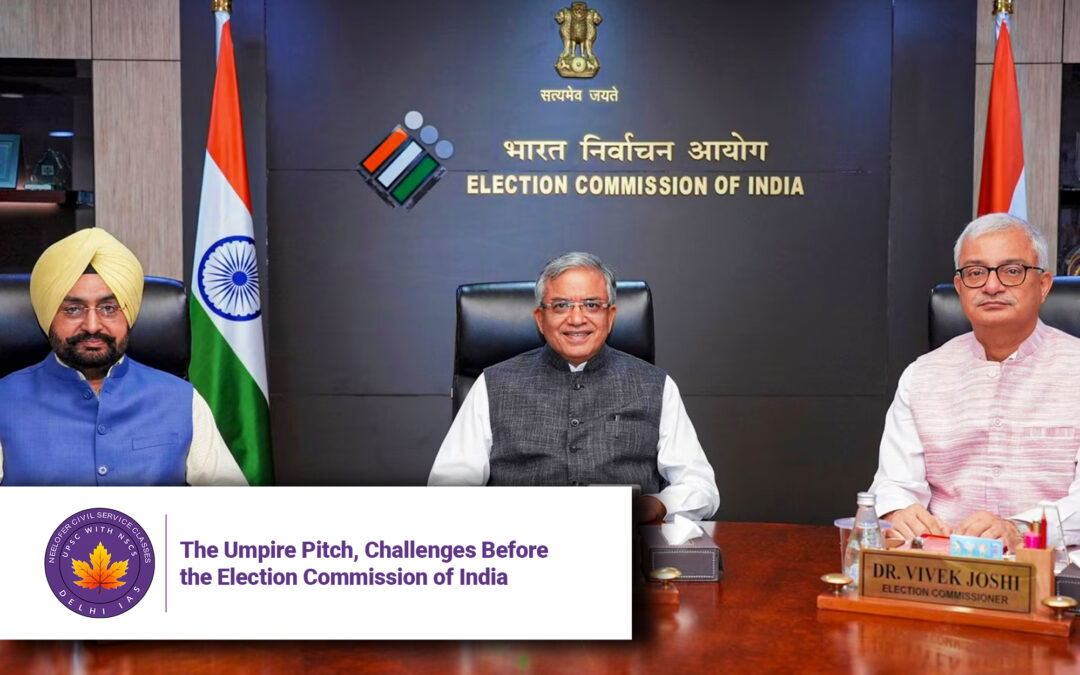The Umpire Pitch, Challenges Before the Election Commission of India
Why in News?
The 79th Independence Day week witnessed a significant press conference by the Election Commission of India (ECI). This media interaction, led by Chief Election Commissioner (CEC) Gyanesh Kumar, aimed to address allegations of large-scale electoral roll discrepancies, disenfranchisement, and charges of “vote chori” (vote theft) raised by political leaders, particularly Rahul Gandhi. While the EC’s outreach was welcome, its responses raised more questions than answers. The episode has thrown into sharp relief the institution’s credibility, its role as a neutral arbiter, and the precarious state of India’s democratic processes.
Introduction
The Election Commission of India, widely seen as the guardian of free and fair elections, is facing an extraordinary crisis of credibility. Allegations of fake voters, duplicate names, mass additions, and manipulated rolls have not only been made by the Opposition but also echoed, albeit differently, by ruling party leaders. In this politically charged climate, the EC’s effort to clarify its position has inadvertently deepened concerns.
The press conference was expected to calm public doubts. Instead, its tone, tenor, and selective silences highlighted a deeper institutional predicament: how can the umpire ensure faith in the game if both teams accuse it of bias?
Key Issues and Institutional Concerns
1. The Allegations of “Vote Chori”
Rahul Gandhi alleged serious manipulation of electoral rolls and turnout figures in states like Maharashtra and Karnataka. In particular, he pointed to discrepancies in constituencies such as Mahadevapura (Karnataka), Wayanad, Diamond Harbour, Rae Bareli, Mainpuri, and Kolathur. These charges struck at the core of electoral credibility and suggested systemic flaws.
At the same time, BJP leader Anurag Thakur echoed similar concerns but with a communal overtone. He targeted constituencies represented by Opposition leaders, alleging fraudulent voters — largely Muslim names such as Mohammad Kaif Khan, Khurshid Alam, Rafiullah, Shah Mohammad, and others. By repeatedly stressing their religion, Thakur gave a communal twist to what should have been a neutral procedural debate.
Thus, both the ruling party and the Opposition, albeit for different reasons, ended up putting the EC in the dock.
2. The EC’s Defensive Posture
In its press conference, the EC emphasized that it works with “the people” and not political parties. It stressed its multi-layered process, assuring that objections to voter rolls can be raised and must be dealt with transparently.
However, the EC’s refusal to acknowledge Rahul Gandhi’s name directly — while simultaneously defending itself against his charges — came across as unnecessarily churlish. An institution claiming neutrality must avoid appearing partisan, and respectful acknowledgment of the Leader of Opposition would have strengthened rather than weakened its authority.
The insistence on “oneness with the people” also rang hollow, since in practice, democracy functions through elected representatives. By avoiding the Opposition’s role, the EC looked evasive rather than impartial.
3. Communalization of Electoral Discourse
The BJP’s narrative, as articulated by Anurag Thakur, was disturbing because it directly linked allegedly fake votes to the Muslim community. By reciting a chilling list of Muslim names and connecting them to Opposition politics, “appeasement,” and “national security,” the discourse shifted dangerously toward communal polarization.
Instead of addressing the technical issues of voter list verification, the debate veered toward identity politics, which risks further eroding public trust in electoral fairness. The EC, by not taking a stronger stand against such rhetoric, appeared to indirectly validate this narrative.
4. Shifting the Burden on Citizens
A deeper problem emerged in the EC’s approach: it placed the burden of proving voter authenticity on citizens rather than ensuring institutional safeguards. The press conference suggested that if any voter’s eligibility is challenged, the onus lies on them to prove their citizenship and inclusion — not on the EC.
This shift of responsibility is problematic. It undermines the very idea of universal suffrage by creating hurdles for marginalized groups who may lack documentation or resources to fight bureaucratic battles. Instead of strengthening faith in the EC, it risks disenfranchising genuine voters.
5. Independence and Autonomy at Risk
The Modi government’s tendency to speak on behalf of the EC has further complicated matters. By attempting to defend the institution, the government undermines its autonomy. A truly independent body must be seen to stand on its own, not with the backing of one political force.
This blurring of lines weakens the EC’s credibility and makes it harder for it to function as the neutral “umpire” it is supposed to be.
Challenges and the Way Forward
-
Credibility Deficit:
The EC must recognize that its reputation is under assault from both sides. Without proactive transparency, its assurances will be insufficient. -
Need for Cross-Party Dialogue:
Electoral rolls and turnout verification should not be left to partisan battles. Cross-party mechanisms, supervised by the EC, are essential for confidence building. -
De-communalizing the Debate:
Electoral legitimacy must be safeguarded against communal polarization. The EC should strongly condemn communal narratives that link fraudulent voting to any community. -
Institutional Autonomy:
The EC must speak for itself. Government leaders should refrain from defending or preempting its stance. Re-establishing its autonomy is key to restoring public trust. -
Transparent Processes:
Urgent reforms are needed to ensure objections to voter lists are addressed fairly, with proper documentation and third-party audits if required. A focus on voter inclusion, not exclusion, should guide every exercise.
Conclusion
The ongoing controversy reveals a sobering truth: India’s electoral umpire is facing its toughest credibility test yet. If the Bihar elections, which are at the heart of current disputes, result in a close contest, allegations of bias could escalate into a political crisis.
The EC’s belligerent refrain — “show the evidence, file an affidavit, or leave it at that” — may not suffice. Instead, it must reclaim its image as a transparent, impartial guardian of democracy. The challenge is enormous: to remain above the fray, to ensure inclusion, to resist politicization, and to command respect across the spectrum.
For a nation celebrating its 79th Independence Day, the health of its electoral democracy is non-negotiable. The umpire’s pitch must be level, fair, and seen as such by all players. Otherwise, the legitimacy of the game itself is at stake.
Q&A Section
Q1. Why did the Election Commission hold a press conference during Independence Day week?
The EC organized the press conference to address widespread questions and apprehensions regarding the Special Intensive Revision of electoral rolls in Bihar. It aimed to reassure the public and respond to allegations of large-scale disenfranchisement and “vote chori” raised by political leaders.
Q2. What were Rahul Gandhi’s allegations against the EC?
Rahul Gandhi accused the EC of allowing manipulation of electoral rolls and turnout figures, particularly in states like Maharashtra and Karnataka. He highlighted discrepancies such as fake voters, duplicate names, and misuse of machinery, citing constituencies like Mahadevapura, Wayanad, Rae Bareli, and Diamond Harbour.
Q3. How did BJP leader Anurag Thakur respond to these allegations?
Anurag Thakur echoed similar concerns but communalized the issue by reading out Muslim names of allegedly fraudulent voters. He linked these cases to Opposition “appeasement politics” and “national security,” thereby framing the debate in religious terms rather than procedural ones.
Q4. Why is the EC being criticized despite holding a press conference?
While the EC addressed technical concerns, its refusal to directly acknowledge the Leader of Opposition, its defensive tone, and its shifting of the burden onto citizens raised doubts. Critics argue that the EC did not adequately recognize the full scale of its institutional challenge.
Q5. What reforms are needed to strengthen the EC’s credibility?
Key reforms include ensuring cross-party oversight of electoral rolls, de-communalizing voter list debates, reinforcing the EC’s autonomy, creating transparent voter verification mechanisms, and prioritizing inclusion over exclusion to protect genuine voters from disenfranchisement.







